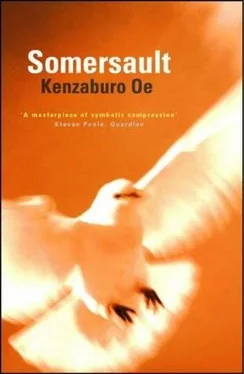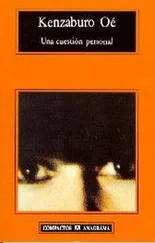Ogi got in touch that day with Ms. Tachibana's office, and they met the fol- lowing day, after she finished work, outside the side gate to the university.
They sat down for a talk on a bank that overlooked a moat, amid a line of cherry trees whose leaves had turned.
Ms. Tachibana had on a white and navy blue suit too subdued for her age, and, in contrast to her introspective demeanor, she strode toward him with firm, determined steps.
Ogi began by explaining to her about the young woman they all called Dancer, how she took care of Patron's daily needs and was responsible for many of the activities they had planned for the future, and then he gave her the message Dancer had asked him to relay. He apologized for his ambiva- lent reply the other day. Ms. Tachibana wasn't interested in talking about the Moosbrugger Committee, but wanted to explain why it was important for her, as an individual, to meet with Patron. Ogi readily agreed. Despite his youth, he was an excellent listener.
"I was once a student at this university," Ms. Tachibana began, "and a little more than ten years ago, just before the Somersault, when my brother and I were still living with our parents, an acquaintance invited me to a small gathering where Patron spoke.
"I wasn't a believer at the time, and though his sermon really moved me, it didn't convert me. At any rate, I'd become friends with the mother of a mentally challenged child who worked at the same welfare office where I took my brother, and she was the one who took me to the gathering. This mother wasn't a believer either.
"Life wasn't easy for me then, because of my brother. He could only use a few words, and has the cognitive ability of a four- or five-year-old, his motor skills about the same. But he has perfect pitch and composes music. He'd al- ready begun composing at the time. Once there was a concert at the Welfare Center and the volunteer pianist advised me to send copies of my brother's compositions to a famous composer, which I did right away. The composer wrote back, saying the melodies were exquisite, and also sent me a copy of a book he wrote. I brought the book with me. Here's what it says."
Ms. Tachibana took out a small hardcover book from her oversized handbag. Ogi motioned her over to some concrete seats shaped like tree stumps.
When one thinks, it's impossible to escape the agency of language. Even when one thinks in the medium of sound, there's an inevitable connec- tion with language. In my case, in order to form a framework in which my thoughts can be clearly expressed in the overall structure of my music and also in the details, I find it necessary to verify things in lan- guage. And I leave it up to a decision of the senses. I discover the themes of my music, too, through this sort of process. It has nothing to do with a poetic mood or anything like it.
"This made me think my brother's music has limitations. It's like there's a bar set up very low, and the music can't get over that hurdle. Perhaps the composer didn't want to hurt my feelings by telling me that directly, and that's why he sent me his book.
"My brother lies on the floor of our apartment, in our public housing apartment, and writes his compositions on music sheets. When he makes a mistake he erases it and then writes down the right notes. It's as if he al- ready has the music in his head and just needs to get the notes down on paper.
"He can't explain in words what kind of music he's trying to compose, and I doubt he's even thinking in words when he does compose. As the com- poser put it, he's unable to verify things in language.
"I started thinking about the limits of my brother's music, and I became quite sad and depressed as I realized what a dead end it was. I was feeling so down the woman I knew at the Welfare Center took me to hear Patron's sermon.
"It took place long ago, but I still remember it well; it was as if his ser- mon reached out and grabbed me right where I live.
"I took notes on his sermon in my notebook here; it was based on the words of a seventeenth-century philosopher: God revealed himself in Christ and in Christ's spirit, not following the words and images the prophets had given.
When the true spirit of things is grasped, apart from words and im- ages, then and only then are they truly understood… Christ actually, and completely, grasped this revelation.
"As I listened to him read each sentence aloud and then comment on it, I couldn't contain myself. I had to ask a question. The meeting was held in a small shop converted into a residence, which because of rising land prices was about to be sold; fifteen or sixteen believers filled this dim room near the en- trance, and we were seated just behind them. I raised my hand, leaned for- ward, and nearly shouted out my question. 'Sir,' I asked, 'I don't know anything about this special person named Christ, but could this be applied instead to someone else-say, an unfortunate person? A person who doesn't even know he's unfortunate and has a pure heart? Is it possible that God could reveal himself directly, not through words, but through music?'
"After I said this, Patron wove his way on unsteady legs through the narrow space between the people sitting in front and came and held my hand and whispered to me, 'That's exactly right!' I was still a young girl, and those words stayed in my heart. I felt as if my body and heart were filled with light."
As if to calm the tide of excitement, Ms. Tachibana was silent for a time, staring at the black trunks of the cherry trees in front of her. Ogi turned his gaze not on the shadows of the cherry leaves but toward the deep-hued autumn foliage of the mistletoe, even now turning darker as night approached.
So even a woman like this, he thought, a serious, modest person who calmly goes about doing her own job and living her own life, was encouraged by Patron. And now, even ten years after the Somersault, that emotion still re- mains alive inside her.
"I've been thinking about this for a long time," she went on, "but if Patron can come to the Moosbrugger Committee, I want to bring my brother along as a kind of test-to see whether Patron would reveal God in him, directly, without words or images. In the past, when my brother listened to music, you could see light filling his body and heart. That was when my par- ents were still alive. But now he's more like an old man; his head droops. I want him to meet Patron and be filled again with light, the way he used to be. Wouldn't that be a sign of God's revelation? I know my idea is a little wild, but after all the trouble you've gone through I just had to tell you. I'm sorry to have kept you so long-I appreciate your listening to me."
"No, I'm the one who should thank you," Ogi said. "I'm glad to hear that Patron has such power, even after the Somersault. Once his plans crys- tallize, you can expect a letter from him."
Ms. Tachibana nodded and stood up, made a slight bow, and walked off alone down the stone pathway in the direction of the Yotsuya Station. Ogi could imagine her taking walks here during her lunch break, with an invari- ably gloomy, serious look on her face. With her stolid way of walking, which took one's attention away from her features or manners, she disappeared down the path, her heels clicking against the stone paving.
So that he wouldn't seem to be following her, Ogi had set off in the opposite direction, down the path through the cherry trees. The farther he went the darker it became, and the only way he could reach the paved road lined with streetlights was to stray off the path and head toward the grassy slope. The moment he stepped off the path that sloped down through the trees, a thick branch of a cherry tree raked across his eyes and nose.
Holding his face, he plopped down on the withered lawn and grumbled a complaint directed less at his own pain than at something beyond.
Читать дальше





